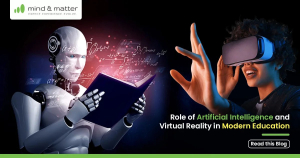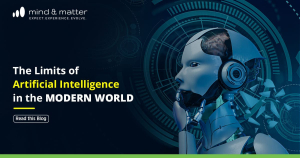Main Menu
Role of Artificial Intelligence and Virtual Reality in Modern Education
The integration of Artificial Intelligence (AI) and Virtual Reality (VR) in the education sector is heralding a new era of interactive and personalized learning. As we delve into the trends of 2023, it's evident that these technologies are not just enhancing the learning experience but are also addressing some of the longstanding challenges in education. Let's explore the evolving landscape of EdTech with a focus on AI and VR.
Artificial Intelligence in Education: A Game-Changer
1. Customized Learning Experiences: AI's most significant impact in education is its ability to personalize learning. Systems like DreamBox Learning and Carnegie Learning use AI to adapt to each student's learning style and pace. This approach has shown to improve engagement and understanding, especially in subjects like mathematics and language arts.
2. Efficient Assessment Systems: Tools like Gradescope and Turnitin use AI to automate grading, significantly reducing the workload for teachers. They also provide valuable feedback to students, allowing for quicker improvements.
3. Enhancing Language Learning: AI-powered language learning apps like Duolingo offer personalized, interactive, and accessible ways to learn new languages. Their speech recognition technology helps in improving pronunciation, a critical aspect of language learning.
4. Predictive Analytics in Education: AI systems can analyze student performance data to predict future learning outcomes and identify potential learning gaps. This is incredibly useful for early intervention and tailored support.
Virtual Reality in Education: Immersive and Interactive Learning
1. Realistic Simulations: In medical education, VR simulations like those offered by Osso VR and ImmersiveTouch are used for surgical training, providing a safe and controlled environment for students to practice and hone their skills.
2. Virtual Field Trips: Google Expeditions and Nearpod offer virtual field trips, allowing students to explore everything from the Great Barrier Reef to Mars in a 3D environment. These experiences can significantly enhance understanding and retention of complex subjects.
3. Interactive Historical and Cultural Education: VR can recreate historical events or sites, offering students a 'time-travel' experience. This immersive form of learning brings history and culture to life, providing a deeper understanding than traditional textbooks.
4. STEM Education: VR can simplify complex scientific concepts through interactive 3D models and simulations. For example, the Unimersiv app allows students to explore the human body in 3D, making anatomy lessons more engaging and comprehensive.
Future Trends and Ongoing Challenges
1. Democratizing Access: A major challenge remains the accessibility of AI and VR technologies, especially in under-resourced schools. Initiatives like HP's VR Classroom aim to address this by providing affordable VR solutions.
2. Ethical and Privacy Considerations: With AI's data-driven approach, safeguarding student privacy and ethical use of data is crucial. Ongoing discussions and regulations are shaping the responsible use of AI in education.
3. Professional Development for Educators: Teachers need to be equipped with the skills to integrate these technologies into their teaching. Continuous professional development and support systems are essential for this transition.
4. Blending Traditional and Tech-based Teaching: Finding the optimal blend of conventional teaching methods and innovative technological approaches is key to maximizing the benefits of AI and VR in education.
Conclusion
The roles of AI and VR in education are multifaceted and evolving. They offer opportunities for more personalized, engaging, and effective learning experiences. As we progress through 2023, the focus is on harnessing these technologies to overcome educational challenges while ensuring equitable access, ethical usage, and the upskilling of educators. The potential of AI and VR in reshaping the educational landscape is immense, promising a future where learning is more adaptive, immersive, and accessible to all.
The Limits of Artificial Intelligence in the Modern World
As we continue to progress through the 21st century, it's hard to ignore the pervasive influence of Artificial Intelligence (AI) in our daily lives. From predictive texting to autonomous vehicles, AI technology promises to revolutionize various industries. However, it's crucial to understand the limitations of AI and what tasks it simply can't do—at least not yet. In this article, we'll explore six key areas where human expertise and creativity continue to outpace AI capabilities.
1. Creativity and Artistic Activities
While AI can create art, music, and stories, it's not the same as when humans do it. Humans put feelings and experiences into their work, which AI can't do. Human artists infuse their work with emotional depth, cultural nuances, and a layer of meaning often born out of unique life experiences. AI-generated art, while impressive in its own right, lacks this depth of emotion and nuance.
Why it Matters
The "soul" of artistic creation cannot be quantified or replicated by algorithms. The process of creation—struggling with an idea, revising it, and putting it into a form that communicates a concept or feeling—is deeply human. AI can mimic styles or generate new patterns, but it cannot conceive a message or imagine a world as humans can.
2. Lawyers and Judges
Legal systems are built on human judgment, societal norms, and moral values, none of which can be adequately quantified for a computer program. While AI can assist in sorting through legal documents or predicting case outcomes based on historical data, it falls short when it comes to making ethical decisions or understanding the small but important details of the law.
Why it Matters
Court cases often depend on how people understand the situation, what they meant to do, and what exactly happened. These things usually need a human to figure out. AI cannot serve as a replacement for the deep understanding and moral reasoning that lawyers and judges bring to our judicial system.
3. Original Ideas
AI can analyze data at superhuman speeds and make predictions based on that analysis, but it can't think creatively or produce original ideas. It can't ask "what if?" or ponder hypotheticals outside of its programming.
Why it Matters
In fields ranging from scientific research to business innovation, the ability to think outside the box and synthesize information in new ways is invaluable. Despite all its computing power, AI lacks the spark of originality that often drives human progress.
4. Computer Scientists and Software Developers
It might sound strange, but the creators of AI—computer scientists and software developers—are also among those least at risk of being replaced by it. AI can assist in coding, debugging, and even some aspects of design, but it can't replicate the innovative thinking, problem-solving skills, and detailed understanding of user needs that humans bring to software development.
Why it Matters
Software development is not just about writing code; it's about solving problems and creating value for users. The work involves complex decision-making, ethical considerations, and often, the need to innovate—all areas where AI falls short.
5. Editors
AI-driven tools like Grammarly have become popular for basic editing tasks, but when it comes to the nuanced work of human editors, AI is still far behind. Editors don't just correct grammar; they also look at context, tone, narrative structure, and the intended audience to refine a piece of writing.
Why it Matters
Good editing makes a piece of writing much better. Editors understand language and what readers want in a way that computers can't. They notice small but important details that a computer would miss.
6. Subject Matter Experts
Expertise in a subject isn't just about possessing a vast amount of knowledge; it's about understanding how and when to apply it. Whether it's a medical diagnosis, historical analysis, or complex engineering problem, subject matter experts use a combination of experience, intuition, and reasoning to arrive at conclusions. AI can assist in data analysis but cannot yet replicate the nuanced understanding and decision-making skills of a human expert.
Conclusion
As we navigate through the era of artificial intelligence, it's important to manage our expectations realistically. AI has the power to change the world in numerous ways, but there are irreplaceable facets of human capability—creativity, expertise, judgment—that it can't mimic. Understanding these limitations helps us appreciate the unique value that humans bring to the table and helps guide us in leveraging AI as a tool rather than an all-encompassing solution.


